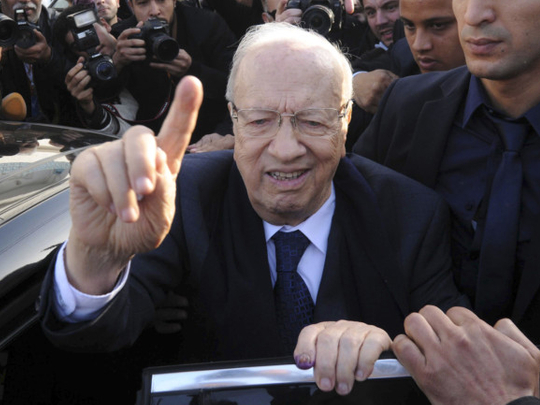
For some, it was the return of the old guard, when a majority of Tunisians voted for a veteran anti-extremist politician into the presidency. Others saw hope, after the head of the Nida Tunis Party, Beji Qaid Al Sebsi, won the country’s first free presidential elections since independence in 1956. Many were persuaded that this cycle would be a transitional term and, regardless of the controversies associated with the campaign, Tunisians affirmed the notion that Arabs were capable, willing, and ready to exercise one of the basic features of democratisation.
To be sure, Al Sebsi touted his nationalist credentials and presented himself as a worthy successor to Habib Bourguiba, the country’s first president, though what was far more important than either the man or his orchestrated legacy was the way Tunisians capped off the changeover to democracy in the birthplace of the Arab Spring. The undeniable fact that elections were held — it is worth repeating — without violence and hopelessness, was the real accomplishment. Of course, police fired tear gas to disperse hundreds of youths who protested against the results, though every observer confirmed that irregularities were very limited because civilised Tunisians, yes civilised Arab voters, exercised their constitutional rights in a peaceful climate even if media outlets anticipated gloom and doom.
Full-fledged democratisation
For critics, the new president’s age — he is 88 — as well as his affiliation with the previous regime confirmed that the country was not ready for full-fledged democratisation, and while mere elections were certainly not sufficient to ensure good governance, it might be better to concentrate on what were the formative influences on Al Sebsi. In fact, the president’s advanced age was a legitimate issue and, ironically, comical because Al Sebsi backed former president Zine Al Abidine Bin Ali in 1987, when the latter forced the founder of modern Tunisia to step aside for being 84. At the time, Bourguiba left, but the argument apparently did not apply to Al Sebsi in 2014 with supporters of the new head-of-state dismissive of the comparison, allegedly because the president-elect was in good health. Be that as it may, the fact remains that at 88, Al Sebsi could not possibly function at the same pace as a younger individual entrusted with the same duties.
More seriously, critics have also raised the cavalier way in which Al Sebsi absconded the founder’s legacy as a true reformer, pointing to his close association with the Bin Ali regime in various capacities. That was certainly true, and it remains to be determined whether this president learned the lesson that courageous Tunisians have taught their nation. What that entailed was simple and elegant: an ideal model for what the Arab Uprisings can achieve. Equally important was their insistence that no one and nothing would be allowed to turn the clock back.
Still, and without taking anything away from Al Sebsi’s well-run campaign, it was eminently clear that Tunisians judged Munsif Al Marzouqi, the long-exiled 69-year-old human rights activist who gained power through the Islamist Al Nahda Party. Voters concluded that Al Marzouqi could not be entrusted with the nation’s fate simply because he preferred hardcore ideology over pragmatism and the all-too necessary creation of wealth that would oil the country’s economic engine. Of course, Al Marzouqi and his supporters were ideally placed to add value as opposition leaders because Tunisians required consensus to govern themselves more effectively, though the fundamental message of these elections was loud and clear: do not discriminate based on extremist and alien values. Tunisians, like all Arabs, remained hopeful. They aspired to a more democratic and prosperous future — one that was faithful to local norms and traditions without being beholden to extremist and violent methods.
It was critical to note that Al Sebsi’s victory, and before it the results of the parliamentary elections, revealed the existence of fault lines in Tunisian society with a largely pro-Nida Tunis north and a pro- Al Nahda south. It may fall on the shoulders of the new president, government and parliament to commit themselves to address the question of regional imbalances, which cannot be pushed under the proverbial rug. Tunisia is not out of the woods yet as the traumas created by years of dictatorship could easily resurface unless effective programmes are introduced to meet popular needs. The Islamist question, a Damocles Sword that hanged over Tunisia just as it also threatened most Arab societies, was still there as well, although voters were categorical as they rejected heavy ideological commitments, traumas galore, and even the potential of an “Islamic State” that threatened to polarise the entire nation. Instead, Tunisians voted for security, stability and political accountability. In an impeccably civilised way.
Dr Joseph A. Kechichian is the author of the forthcoming Iffat Al Thunayan: An Arabian Queen, London: Sussex Academic Press, 2015.








